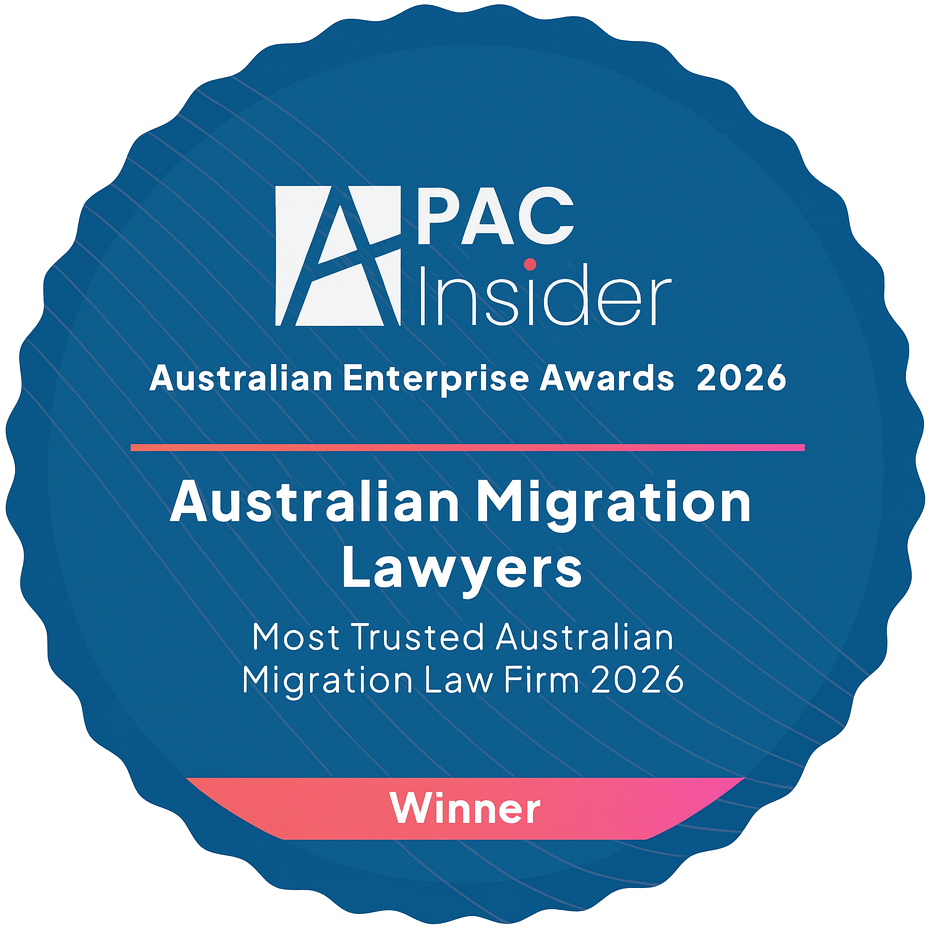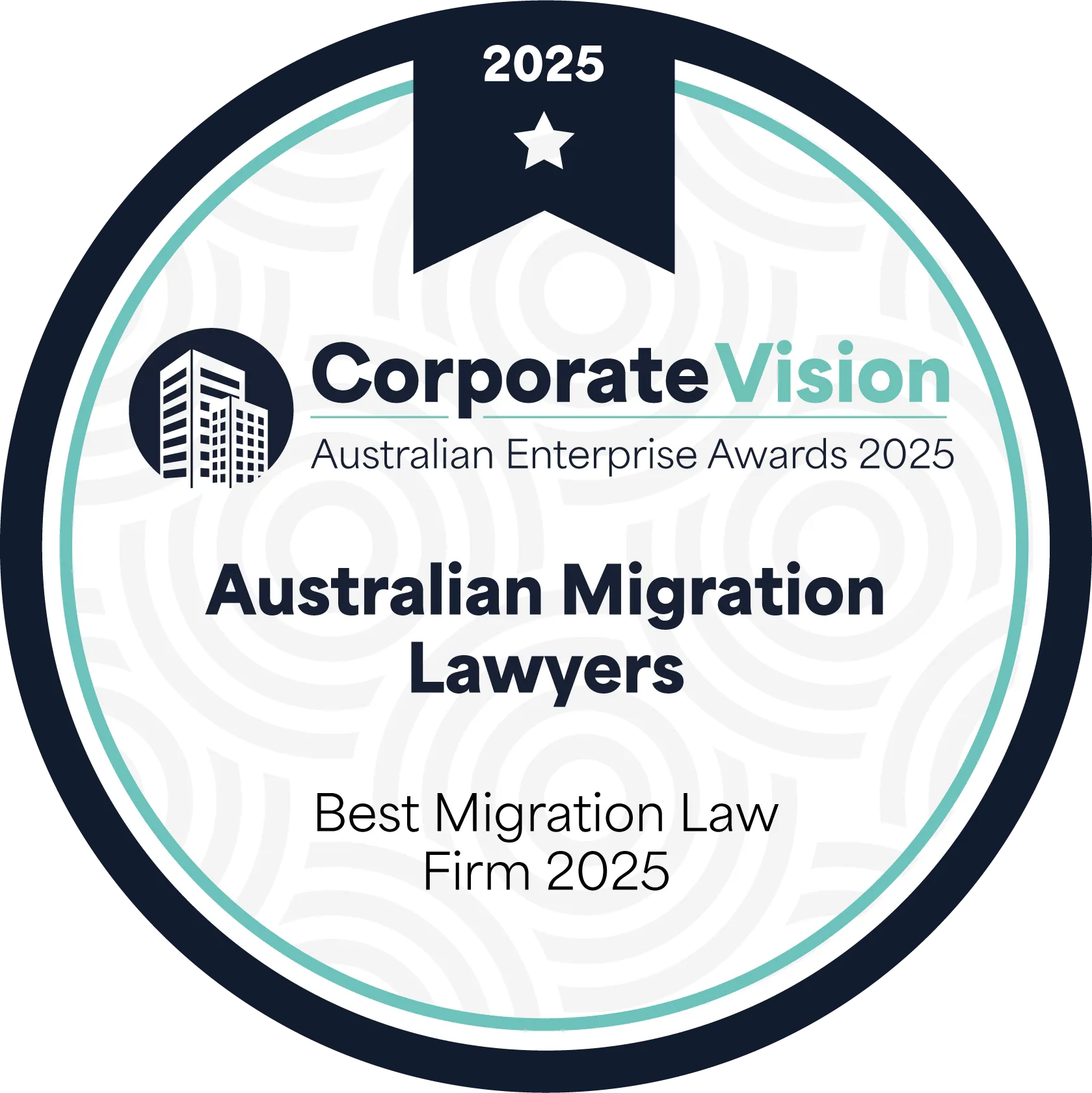Australia's largest independent migration law firm. Open 7 days! Book here.
Need help? We are available 7 days a week.

.webp)

Winner of Most Trusted Australian Migration Law Firm 2023-2026

Ranked 1st for migration law in 2023, 2024 & 2025

Ranked in the top migration lawyers 2023, 2024 & 2025

Ranked the best migration law firm 2024 & 2025
%20(1).webp)
The cost of a partner visa in Australia has risen significantly over the last decade and continues to increase. How much you will end up paying depends on several factors, including whether your partner visa is granted in the first instance or if you need to appeal a refusal to Australia’s Administrative Review Tribunal (ART). Unlike tourist or student visas, the partner visa process is part of a permanent residency (PR) pathway and involves a more rigorous assessment process.
Watch the below video to learn more:
The primary cost you must consider is the visa application fee, payable to the Australian Government at the time of submission. This fee varies depending on the type of Australian partner visa you are applying for and whether you are applying from within or outside Australia.
As of 1 July 2024, the base application fee is substantial, making it one of the most expensive visas in Australia. According to the Department of Home Affairs, a partner visa application starts at costs of around $9,095 (AUD).
[free_consultation]
If you are interested in getting more information about a partner visa, get in touch with Australian Migration Lawyers.
[/free_consultation]
Applicants should be aware of other costs besides the application fee, including medical examinations, police checks, biometrics collection, and document translation. Each of these can add significantly to the total cost of the visa application process.
Visa application fee: This is the main cost you need to pay to the Australian Government when you submit your application.
A family visa can normally incur the following fees:
[table]
[thead]
[tr]
[th]Visa Type[/th]
[th]Main Applicant Cost (AUD)[/th]
[th]Additional Applicant Cost (AUD)[/th]
[/tr]
[/thead]
[tbody]
[tr]
[td]Partner visa (subclass 820/801 or 309/100)[/td]
[td]$9,365 [/td]
[td]$4,685 – any child over 18 and $2,345 – each child under 18 years of age [/td]
[/tr]
[tr]
[td]Prospective Marriage visa (subclass 300)[/td]
[td]$9,365 [/td]
[td]$4,685 – any child over 18 and $2,345 – each child under 18 years of age [/td]
[/tr]
[/tbody]
[/table]
The primary fee is required when submitting your application to the Australian Government. For most applicants, this is the largest upfront cost.
Every person included in your application must undergo a medical examination. The cost is approximately $500 per adult and $350 per child, and it must be paid directly to the doctor conducting the examination.
In some cases, applicants may be required to provide biometrics, including fingerprints and facial structure photos. This fee is paid to the Australian Biometric Collection Centres or their overseas service providers.
Applicants might need to undergo police checks in the countries where they have lived for 12 months or more over the past 10 years. This fee is paid directly to the police authorities in those countries.
If your documents are not in English, they will need to be translated. The cost for this service varies depending on the complexity and number of documents, and it must be paid directly to the translator.
If your partner visa application is refused and you decide to appeal to the Administrative Review Tribunal (ART), you will need to pay a fee of $3,496. If the tribunal overturns the decision and grants your visa, you may be eligible for a 50% refund of this fee.
Remember, these are the fees as of 1 July 2024. It's always a good idea to check the most current fees on the Australian Government's website or with an Australian Migration Lawyer to ensure you have the most accurate and up-to-date information.
[aml_difference][/aml_difference]
[table]
[thead]
[tr]
[th]Cost Type[/th]
[th]Details[/th]
[th]Approximate Cost[/th]
[/tr]
[/thead]
[tbody]
[tr]
[td]Visa Application Fee [/td]
[td]The primary fee is paid to the Australian Government upon submission [/td]
[td]Varies by visa subclass [/td]
[/tr]
[tr]
[td]Medical Examination Costs [/td]
[td]Mandatory medical exams for all applicants are paid directly to the doctor [/td]
[td]$500 per adult, $350 per child [/td]
[/tr]
[tr]
[td]Biometrics Collection Costs[/td]
[td]The fee for providing fingerprints and facial photos is paid to biometric centres [/td]
[td]Varies by visa location [/td]
[/tr]
[tr]
[td]Police Checks Costs [/td]
[td]Police checks required for countries lived in for 12+ months, paid directly to authorities [/td]
[td]Varies by country [/td]
[/tr]
[tr]
[td]Document Translation Costs [/td]
[td]The cost of translating non-English [/td]
[td]Varies by document [/td]
[/tr]
[/tr]
[tr]
[td]Tribunal Application Fee [/td]
[td]The fee for appealing to the Administrative Review Tribunal. If successful, 50% of the fee is refunded [/td]
[td]$3,496 [/td]
[/tbody]
[/table]
Several factors can impact the overall cost of obtaining a partner visa in Australia. Understanding these can help you better prepare for the financial commitment involved.
The type of partner visa you apply for significantly impacts the overall cost. There are several subclasses of partner visas, including temporary and permanent options. Temporary partner visas, such as Subclass 820 (onshore) and Subclass 309 (offshore), are often the first step before obtaining a permanent partner visa (Subclass 801 or Subclass 100).
The cost difference between these visa types can be significant, so it's essential to understand which visa suits your situation best and budget accordingly.
Your location when applying for a partner visa can also affect the cost. If you apply from within Australia (onshore), you will apply for a visa subclass different from those outside the country (offshore). Onshore applications might come with additional costs, such as extended health insurance requirements, given the waiting period in Australia.
Conversely, offshore applicants may face different fees depending on their country's specific requirements, including potentially higher costs for document translation or biometrics collection. It's crucial to factor in these geographical considerations when planning your application.
Many applicants choose to engage a registered migration agent or lawyer to assist with their partner visa application. While this can significantly increase the overall cost, it often provides peace of mind, ensuring that the application is thoroughly prepared and meets all requirements.
Professional fees can vary widely depending on your case's complexity, the migration agent's or lawyer's reputation, and whether additional services, such as tribunal representation, are needed. While these fees are an added expense, they can increase the likelihood of a successful application, potentially saving you from the more considerable cost of reapplying or appealing a refusal.
The processing time for partner visas can vary, and in some cases, applicants may opt for expedited processing if available, which can come at an additional cost. While this isn't an option for all visa types, understanding the potential costs associated with faster processing can be important if your circumstances require a quicker decision. Expedited processing fees can add to the overall cost but may be worth it to avoid extended waiting periods, especially if you're planning significant life changes based on your visa status.
The total cost will increase if your partner visa application includes dependent children or other family members. Each additional applicant typically requires additional fees, including visa application fees, medical examinations, police checks, and biometrics collection. The more dependents you include in your application, the higher the overall cost will be. It's important to account for these additional expenses when budgeting for your partner visa, especially if you have a large family or plan to bring multiple dependents to Australia.
Understanding when each payment is due can help you manage the financial aspect of your visa application more effectively. Not all costs associated with a partner visa are due upfront; they are staggered throughout the application process.
The most significant upfront cost is the visa application fee, which must be paid at the time of submitting your application. This fee is required to lodge your application with the Australian Government and is non-refundable, even if your application is refused.
Additionally, you may need to pay for initial medical examinations upfront, especially if these are required early in the application process. Preparing for these upfront costs is crucial as they represent a substantial financial commitment.
During the processing period, you may incur ongoing costs, such as police checks and document translation. These costs arise as your application progresses and are necessary to meet the legal and documentation requirements.
For example, if you’ve lived in multiple countries, you may need to obtain police certificates from each, which can add up. Document translation is another ongoing cost, particularly if your documents are not in English. Budgeting for these costs as they arise is important, as well as ensuring that your application remains on track without delays.
In some cases, final costs may arise, particularly if your application is initially refused and you choose to appeal the decision. The tribunal application fee is a significant final cost, payable when lodging an appeal with the Administrative Review Tribunal (ART). This fee must be paid upfront when filing your appeal, and while you may be eligible for a partial refund if your appeal is successful, it's a substantial expense that should be considered when planning for potential outcomes.
The Prospective Marriage Visa (subclass 300) has an application fee that is substantial, and there are also further fees once arriving in Australia in order to obtain permanent residency. In addition to the visa application fee, additional costs may include medical examinations, police checks, and document translation. This visa is designed for prospective marriage visa holders intending to marry their Australian partner.
The cost of an Australian partner visa can be significant, especially when considering both the initial application fee and the associated costs, such as health checks, police certificates, and biometrics collection. The partner visa subclass 820 is a temporary partner visa, and its application fee is one of the largest expenses in the process. Then, the application for a permanent partner visa follows.
Yes, if you are applying as a de facto partner, the costs are similar to those applying as a married partner. You will need to budget for the partner visa fee, medical examinations, police checks, and possibly document translation. Additionally, proving a genuine relationship may require gathering and submitting various forms of evidence, which could incur further costs.
Permanent residents sponsoring a partner for a visa, including those applying for a temporary partner visa or permanent partner visas, should consider the partner visa fee as well as additional expenses such as legal fees if they choose to engage a migration agent, medical exams, and police checks. The overall cost can be substantial, and sponsors should prepare accordingly.
If you hold a Prospective Marriage Visa and plan to apply for an Australian partner visa after marriage, you will need to pay a new partner visa fee for the subsequent application. This cost is separate from the initial prospective marriage visas subclass 300 fee and includes additional charges for medical checks and police certificates.
While eligible New Zealand citizens can sponsor their partner for a visa, the costs are generally the same as those for Australian citizens and permanent residents. The main expenses include the partner visa fee. There may also be costs related to proving a genuine relationship and meeting the visa requirements.
Managing the costs of a partner visa in Australia involves understanding various fees, including the visa application fee, medical exams, police checks, and document translations. Factors like visa type, location, and whether you hire a migration agent can also impact the total cost.
By planning ahead and knowing when payments are due, you can better navigate the financial aspects of your application. For tailored guidance, reach out to Australian Migration Lawyers—we're here to help you every step of the way.

We have created comprehensive visa guides that outline the ins and outs of visa applications. Get yours today.